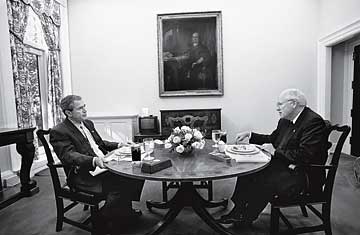
Bush and Cheney, pictured in October 2001, planned the war on terrorism but broke over whether to pardon one of its key architects
(9 of 9)
Bush and Cheney remain friends but have gone in different directions since leaving office. Bush returned to Texas, where he is raising millions for his presidential library and writing a book about his most pivotal decisions as President. Bush believes he put the war on terrorism and the war in Iraq on solid footings and will let history speak for his presidency. And Barack Obama? He "deserves my silence," Bush has said.
For Cheney, the fight goes on. Working from a transition office in McLean, Va., he immediately re-entered the fray. He gave a number of high-profile TV interviews in which he decried the closing of the detention facility at Guantánamo Bay and defended what the Bush team called "enhanced interrogations," including waterboarding, as necessary intelligence tools to safeguard the nation. He also warned of another terrorist attack if Obama's policies were left unchecked. He assumed the role of opposition leader on May 21, challenging Obama's antiterrorism policies in a televised speech. Only minutes earlier, Obama had given an address defending his plans for detaining and trying al-Qaeda members on U.S. soil. Cheney is writing a book as well.
Former Bush aides say Cheney's behavior needlessly stoked anti-Bush sentiment, which had only just begun to subside in voters. For Cheney, however, the ongoing battles are an extension of the fight he waged for several years on behalf of Libby. Cheney, says an ally, believes that the true legacy of the Bush years is the uncompromising way he and the President waged the war on terrorism. But Cheney also believes that Bush cannot claim that as a legacy if he fails to protect the aides and officials who carried out the dirty work.
It is an increasingly lonely fight. But as Democrats edge closer to probing the Bush-era practices, perhaps including CIA interrogators, Justice Department lawyers and Cheney's closest aides, it appears his darkest fears may be coming true. Since Cheney was often the man responsible for the policies that are now under scrutiny, it is perhaps no surprise that he is leading the counterrevolt. "I think it is very, very important that we have a clear understanding that what happened here was an honorable approach to defending the nation," Cheney said on May 10. "There was nothing devious or deceitful or dishonest or illegal about what was done."
This is the case Dick Cheney made for years in the Bush White House, prevailing for a long time, until he was outnumbered and outgunned. And it is one he seems prepared to make, without Bush at his side, for a long time to come.
